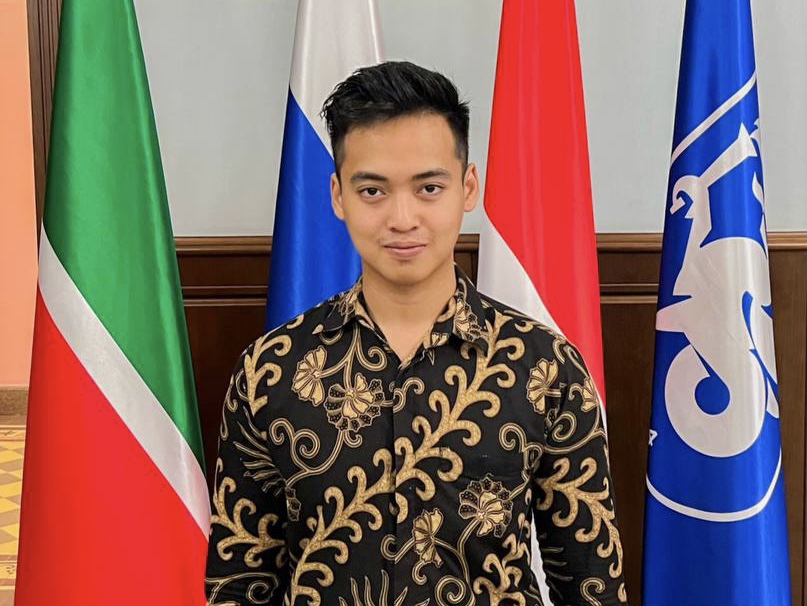Rifki Kusuma Vardana: “I was most surprised by the climate”

Second Home, a new project by the Department of Information Policy, speaks about international students and their life in Kazan.
Today, 11,622 foreign citizens are studying at Kazan University, and 1,391 are students of the preparatory course. Among them is an Indonesian national, junior year student of the Institute of International Relations, History and Oriental Studies, Rifki Kusuma Wardana.
Ushanka hats, nesting dolls and bears: how foreigners imagine Russia
“What surprised me most was the climate – it is much colder here in winter than I expected. I was also awestruck by local architecture, which combines Russian, Tatar and European styles,” the student recalled his first impression.
During the conversation, Rifki admitted that before moving to Russia he had heard of many stereotypes.
“In reality, everything turned out to be far from that. People are very friendly, especially my classmates, always ready to help. And I have only seen a bear in the zoo,” the Indonesian says with a smile.
In order to better understand Russian culture, the young man participates in various celebrations. For example, he celebrated the New Year according to all the traditions, ate pancakes on Maslenitsa, and attended an event on the occasion of the Victory Day.
“You can also get a feel for a certain culture through food. In Russian cuisine, I was very surprised by borscht. It is not just a soup, but a whole cultural phenomenon symbolizing home comfort and hospitality. Borscht is a great addition to winter,” says he.
Getting to know Tatarstan
Wardana says the most memorable moment of his time in a new country is the national holiday Sabantuy, with its colorful games and customs.
“Of Tatar cuisine, I liked chak-chak, of course. It’s sweet, but not treacly. It also has an interesting texture,” says the student.
To get closer to the culture of Tatarstan, Wardana learned some Tatar words: isәnmesez (hello), rәkhmәt (thank you), sau bulygyz (goodbye).
Over the course of several years of living in Kazan, the young man has found his favorite places, “When my relatives from Indonesia come to visit, I will definitely show them the Kazan Kremlin, the Blue Lakes, and Lake Kaban. They are the most beautiful and iconic places in the city.”
The main building of the university did not leave him indifferent either. Wardana considers this place to be a very beautiful historical monument.
KFU for international students
Rifki chose Kazan University for his studies for a reason. In his opinion, KFU is one of the best universities in Russia with a developed international community and excellent conditions for students.
“I was attracted by the support of foreign students at KFU. In addition, there are many cultural events that help you feel like a part of your alma mater,” he commented.
In addition to studying, Rifki partakes in extracurricular activities, attends various events related to international cooperation, and offers ideas on how to improve the quality of adaptation of foreign students.
“I was also the Deputy President of the Association of Indonesian Students in Kazan, and then the Deputy President of the Association of Indonesian Students in Russia. Since September last year, I have been entrusted with the position of director of organizational quality assurance at the Global Association of Indonesian Students,” the activist says.
Thanks to all his merits and qualifications, he accepted the position of the chairman of KFU’s International Friendship Club.
A multinational family
The club is an association of students of different nationalities, aimed at developing intercultural communication, adaptation of foreign students and strengthening friendly ties between representatives of different countries.
“We help newcomers adapt to the educational environment and life in Russia; we hold meetings where students can share the traditions of their countries; we consult on issues of accommodation, paperwork and the educational process,” the club’s director outlined the objectives.
In addition, the student association holds a number of other useful events for students: sports tournaments, meetings of language and international discussion clubs, and volunteer activities.
“We plan to make videos about what an overseas student who has just arrived in Russia should know. Simple instructions will be much more interesting in a video format. We will also prepare videos with interesting facts about the country, the Republic of Tatarstan, and KFU, in particular, to attract new applicants,” the activist announced.
Such international clubs, in his opinion, are extremely important. They reduce the stress of adaptation – getting to know a new culture is more comfortable; promote social integration – students find friends and learn to interact with people of different nations; create a warm atmosphere at the university.
“I believe that our club is not just a community, but real support for every international student at Kazan University,” the interlocutor added.
What’s next?
In the future, Vardana wants to become a diplomat and represent his homeland in the international arena. The young man plans to return to Indonesia and apply the knowledge he gained at the university to develop diplomatic relations between countries.

